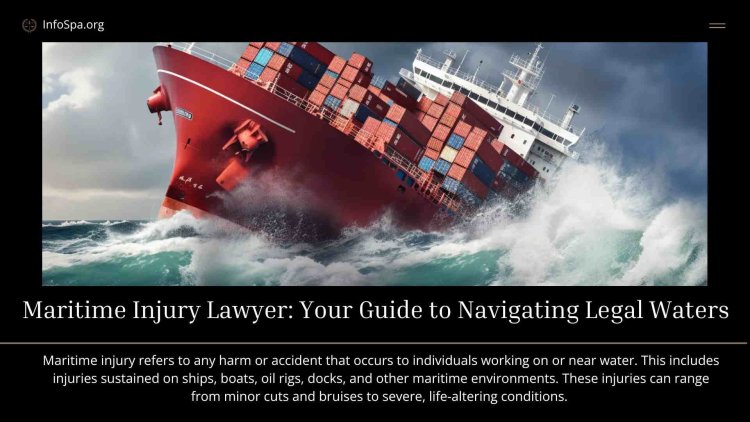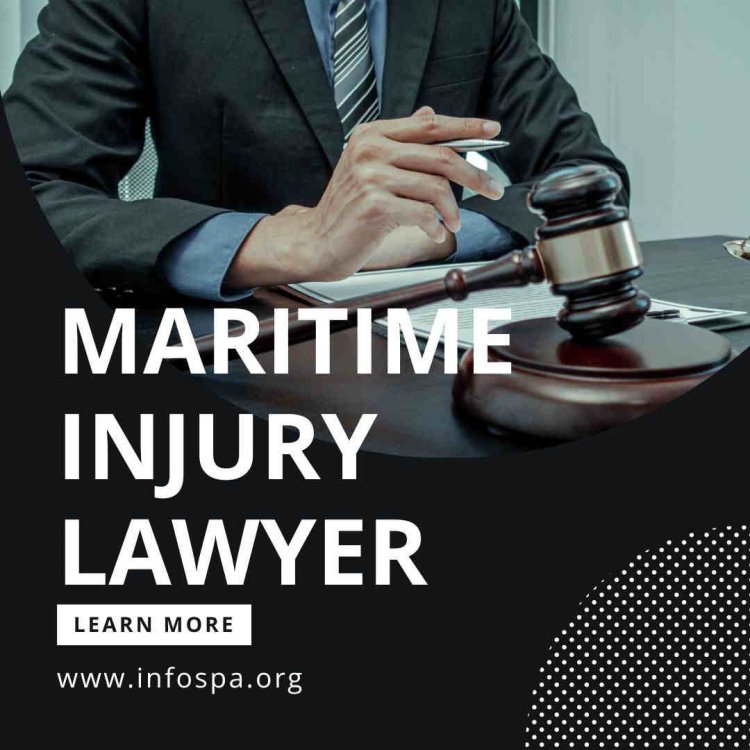Maritime Injury Lawyer: Your Guide to Navigating Legal Waters
This is where a maritime injury lawyer comes in, acting as your lighthouse, guiding you through the stormy waters of maritime law.

Introduction
|
| Working at sea comes with unique challenges and risks. Whether you're a seafarer, a dock worker, or involved in offshore operations, the ocean is a dynamic and often dangerous workplace. If you've suffered an injury while working at sea, you may find yourself adrift in a sea of legal jargon and complexities. This is where a maritime injury lawyer comes in, acting as your lighthouse, guiding you through the stormy waters of maritime law. |
Also Read: Houston Maritime Attorney: Your Guide to Navigating Maritime...
1 Understanding Maritime Injury
What is Maritime Injury?
Maritime injury refers to any harm or accident that occurs to individuals working on or near water. This includes injuries sustained on ships, boats, oil rigs, docks, and other maritime environments. These injuries can range from minor cuts and bruises to severe, life-altering conditions.
Common Causes of Maritime Injuries
Maritime injuries can occur due to various reasons, including equipment failure, slips and falls, heavy lifting, hazardous weather conditions, and insufficient safety measures. The nature of maritime work often exposes workers to high risks, making it crucial to understand the common causes to prevent future incidents. |
2 The Role of a Maritime Injury Lawyer
Who is a Maritime Injury Lawyer?
A maritime injury lawyer specializes in laws and regulations related to maritime activities. These legal experts have extensive knowledge of the specific laws that protect maritime workers and are skilled in handling cases involving injuries sustained at sea.
Why You Need a Maritime Injury Lawyer
Navigating maritime law without professional help can be overwhelming. A maritime injury lawyer helps you understand your rights, gathers necessary evidence, negotiates with insurance companies, and represents you in court if needed. Their expertise ensures you receive fair compensation and justice for your injuries.
3 Types of Maritime Injuries
Physical Injuries
Physical injuries in the maritime industry can be severe and diverse, including fractures, burns, spinal injuries, and amputations. These injuries often require extensive medical treatment and long-term rehabilitation.
Psychological Impact
Working in a high-risk environment like the sea can also lead to psychological injuries. Post-traumatic stress disorder (PTSD), anxiety, and depression are common among maritime workers, affecting their quality of life and work performance.
Also Read: Personal Injury Lawsuit: Filing a Personal Injury Lawsuit...
4 Key Laws Protecting Maritime Workers
The Jones Act
The Jones Act is a federal statute that protects seamen who are injured in the course of their employment. It allows them to seek compensation from their employers for injuries caused by negligence. This law is a critical tool for maritime workers seeking justice and fair treatment.
The Longshore and Harbor Workers' Compensation Act
This act offers compensation to dockworkers and other maritime employees who are injured on navigable waters or in adjoining areas like docks and terminals. It covers medical expenses, rehabilitation costs, and lost wages.
General Maritime Law
General Maritime Law, also known as admiralty law, encompasses various statutes and case laws that govern maritime activities. It provides a framework for resolving disputes and ensuring the safety and rights of maritime workers.
5 Steps to Take After a Maritime Injury
Seek Medical Attention
Your health is the top priority. Immediately seek medical care for your injuries, regardless of how minor they may seem. A medical professional can properly assess your condition and provide necessary treatment.
Report the Injury
Notify your employer about the incident as soon as possible. Reporting the injury is essential for documenting the event and initiating the process for compensation claims.
Document Everything
Keep detailed records of the incident, including photographs, witness statements, and medical reports. Documentation is crucial in building a strong case for your claim.
Contact a Maritime Injury Lawyer
Reach out to a qualified maritime injury lawyer to discuss your case. They will provide guidance on the next steps and help you navigate the legal process.
Also Read: Best Compare Car Insurance 2024: All Car Insurance Companies

6 How to Choose the Right Maritime Injury Lawyer
Experience and Expertise
Look for a lawyer with extensive experience in maritime injury cases. Their expertise will be invaluable in understanding the complexities of maritime law and ensuring the best possible outcome for your case.
Client Testimonials and Reviews
Check reviews and testimonials from previous clients. Positive feedback and successful case outcomes can give you confidence in the lawyer's abilities.
Initial Consultation
Many lawyers offer free initial consultations. Use this opportunity to discuss your case, ask questions, and gauge whether the lawyer is a good fit for you.
7 The Legal Process for Maritime Injury Claims
Filing a Claim
The first step in pursuing a maritime injury case is filing a claim. Your lawyer will help you prepare and submit the necessary paperwork to initiate the process.
Investigation and Evidence Gathering
Your lawyer will conduct a thorough investigation, gathering evidence such as medical records, accident reports, and witness testimonies to build a strong case.
Negotiation and Settlement
Many maritime injury cases are settled out of court. Your lawyer will negotiate with the responsible parties and insurance companies to secure a fair settlement.
Going to Trial
If a settlement cannot be reached, your case may go to trial. Your lawyer will represent you in court, presenting evidence and arguments to advocate for your rights.
Also Read: Motorcycle Accident Lawyer.Need a Motorcycle Accident Attorney?
8 Compensation for Maritime Injuries
Types of Compensation Available
Maritime injury compensation can cover medical expenses, lost wages, pain and suffering, and rehabilitation costs. The aim is to provide financial relief and support your recovery.
Factors Affecting Compensation Amount
The amount of compensation depends on factors like the severity of your injury, the impact on your ability to work, and the degree of negligence involved.
9 Challenges in Maritime Injury Cases
Jurisdiction Issues
Maritime cases often involve complex jurisdictional issues, determining which laws apply and where the case should be filed. An experienced lawyer will navigate these challenges effectively.
Proving Negligence
Establishing negligence is crucial for a successful claim. Your lawyer must demonstrate that your injury was due to the employer's failure to provide a safe working environment.
Dealing with Insurance Companies
Insurance companies may try to minimize payouts. A skilled lawyer will handle negotiations, ensuring you receive the compensation you deserve.
Conclusion
Suffering a maritime injury can be a life-altering event, but you don't have to face it alone. A maritime injury lawyer can be your strongest ally, providing the expertise and support you need to navigate the complex legal waters and secure the compensation you deserve. Remember, taking swift action and choosing the right legal representation can make all the difference in your recovery journey.


























